|
|
|
Sort Order |
|
|
|
Items / Page
|
|
|
|
|
|
|
| Srl | Item |
| 1 |
ID:
117042
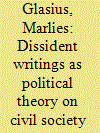

|
|
|
|
|
| Publication |
2012.
|
| Summary/Abstract |
This article offers an analysis of precisely how civil society and its relation to democracy were conceptualised by its East European and South American proponents in their pre-democratic contexts, through an examination of declarations, newspaper articles, samizdat essays, diaries, letters from prison, academic articles and prize acceptance speeches written at the time. The analysis of these source materials is organised under three main themes: the first concerns activists' understanding of the nature of the regime, its aims and its relation to society; the second relates to the features of the emergent civil society the writers of these documents desired, observed, and helped to create; and the final section discusses their strategies and aspirations in relation to 'democratisation'. On the basis of an analysis of commonalities in ideas across these two very different regional and ideological contexts, hypotheses are formulated as building blocks for a political theory of civil society under authoritarian rule, which may apply in yet other, contemporary contexts.
|
|
|
|
|
|
|
|
|
|
|
|
|
|
|
|
| 2 |
ID:
053614
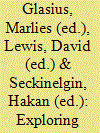

|
|
|
|
|
| Publication |
London, Routledge, 2004.
|
| Description |
x, 213p.
|
| Standard Number |
0415325455
|
|
|
|
|
|
|
|
|
|
|
|
Copies: C:1/I:0,R:0,Q:0
Circulation
| Accession# | Call# | Current Location | Status | Policy | Location |
| 048595 | 300/GLA 048595 | Main | On Shelf | General | |
|
|
|
|
| 3 |
ID:
058169


|
|
|
|
|
| Publication |
New Delhi, Sage Publications, 2005.
|
| Description |
xiii, 375p.
|
| Standard Number |
1412903076
|
|
|
|
|
|
|
|
|
|
|
|
Copies: C:1/I:0,R:0,Q:0
Circulation
| Accession# | Call# | Current Location | Status | Policy | Location |
| 049023 | 320.11/ANH 049023 | Main | On Shelf | General | |
|
|
|
|
| 4 |
ID:
067967
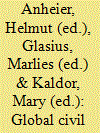

|
|
|
|
|
| Publication |
New Delhi, Sage Publication, 2006.
|
| Description |
xiii, 487p.
|
| Standard Number |
1412911931
|
|
|
|
|
|
|
|
|
|
|
|
Copies: C:1/I:0,R:0,Q:0
Circulation
| Accession# | Call# | Current Location | Status | Policy | Location |
| 050860 | 320.11/ANH 050860 | Main | On Shelf | General | |
|
|
|
|
| 5 |
ID:
085768
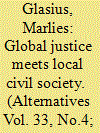

|
|
|
|
|
| Publication |
2008.
|
| Summary/Abstract |
As a new justice institution, the International Criminal Court (ICC) needs to gain legitimacy not just with states but also in civil society, both at the global level and in the societies in which it intervenes. This article, based on interviews, NGO documents, newspaper articles, and participatory observation, looks at civil-society relations with the ICC in relation to its most recent and least publicized investigation-that in the Central African Republic (CAR). It charts the role of civil-society organizations, local and international, in the opening of the investigation, and it discusses the initial responses to the investigation of civil-society figures and victims in the CAR. It finds that unlike in any of the other situations, the ICC's involvement in the CAR has been largely instigated by local civil-society figures and that, as a result, it operates in a quite receptive context. However, the slow pace of investigations and trials, the meager outreach to date, and the court's probable lack of capacity to provide victims with physical and material security are long-term challenges for its ability to meet local expectations of justice.
|
|
|
|
|
|
|
|
|
|
|
|
|
|
|
|
| 6 |
ID:
066373
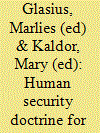

|
|
|
|
|
| Publication |
London, Routledge, 2006.
|
| Description |
xviii, 366p.
|
| Standard Number |
041536745X
|
|
|
|
|
|
|
|
|
|
|
|
Copies: C:1/I:0,R:0,Q:0
Circulation
| Accession# | Call# | Current Location | Status | Policy | Location |
| 050249 | 327.17/GLA 050249 | Main | On Shelf | General | |
|
|
|
|
| 7 |
ID:
080871
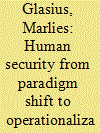

|
|
|
|
|
| Publication |
2008.
|
| Summary/Abstract |
This article shows how human security has functioned as both a paradigm-shifting and a bridging concept, with its most significant implications being, first, the shift from a focus on state security to one on human rights, and, second, the indivisibility of physical and material security. The article will argue that, despite attempts at narrowing and appropriation, human security has lost neither its radical edge nor its holistic character; however, the bulk of the literature on the subject is theoretical, and there has not been a serious enough effort to operationalize the term so as to enable a real shift in policymaking. The second half of the article is an attempt to operationalize human security while respecting its paradigm-shifting and holistic character. It discusses necessary connections with wider policy shifts before outlining ways in which current intelligence, development, military and `state-building' practices would have to be transformed to serve human security. Finally, a sketch is drawn of the ideal `human security worker' of the future and the contexts in which she might work.
|
|
|
|
|
|
|
|
|
|
|
|
|
|
|
|
| 8 |
ID:
085975
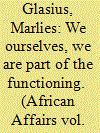

|
|
|
|
|
| Publication |
2009.
|
| Summary/Abstract |
As a new justice institution, the International Criminal Court needs to gain legitimacy not just with states, but also in civil society, both at the global level and in the societies in which it intervenes. This article, based on interviews, NGO documents, newspaper articles, and participatory observation, looks at civil society relations with the ICC in relation to its most recent and least publicized investigation, in the Central African Republic (CAR). It charts the role of civil society organizations, local and international, in the opening of the investigation, and it discusses the initial responses of civil society figures and victims in the CAR to the investigation. It finds that, unlike in any of the other situations, the ICC's involvement in the CAR has been largely instigated by local civil society figures, and that, as a result, it operates in a quite receptive context. However, the slow pace of investigations and trials, the meagre outreach to date, and the Court's probable lack of capacity to provide victims with physical and material security are long-term challenges to its ability to meet local expectations of justice
|
|
|
|
|
|
|
|
|
|
|
|
|
|
|
|
|
|
|
|
|